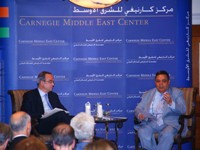Registration
Thank you!
You will receive an email confirming your registration.
IMGXYZ3098IMGZYXThe peaceful anti-regime demonstrations in Libya have evolved into a military struggle between the rebels and government loyalists to end the 42-year rule of Colonel Muammar Gaddafi. In a talk moderated by Carnegie’s Marwan Muasher, Mahmud Shammam of the Libyan National Transitional Council discussed the factors that culminated in the militarization of the conflict, how NATO became involved, and charted a path for the post-Gaddafi era.
Violence and Militarization
Shammam argued that Gaddafi’s long reign took a toll both on Libyan state institutions and on its society. As a result, people caught up in the optimism of the Arab Spring took to the streets to protest Gaddafi’s dictatorship.
- Violent suppression: The Gaddafi regime used violence to suppress the protesters, who were forced to resort to arms to protect themselves.
- Asymmetries: Any talk of atrocities perpetrated on both sides of the conflict is not accurate, explained Shammam. There are clear asymmetries in the struggle: the government possesses sophisticated weaponry, while the rebels must make do with light arms, often fighting from the top of civilian vehicles, he added.
National Transitional Council
The National Transitional Council has surpassed the achievements of the revolutions in Tunisia and Egypt by creating a completely new regime, contended Shammam.
- A halt to government funds: As the conflict militarized, Gaddafi withdrew funding to regions under rebel control, said Shammam.
- Foreign aid: The Transitional Council has not received any foreign money transfers, except for money from Libyans living abroad, Shammam explained. Instead, it has been offered aid in other forms.
- Social services: Despite its limited funds, the Council is still paying social benefits and pensions, Shammam said. He added that the Council is asking for more aid, medication, and food into Libya.
Islam and Islamists
- Homogeneity: Shammam said that Libyan society is entirely Muslim and thus it is natural for some portions of society to be interested in being governed by Islamic Sharia. He pointed out that when Libyan society had significant Christian and Jewish minorities, back in the 1950s, those communities were represented in parliament. However, modern Libya is currently of a uniform composition.
- Al-qaeda: The National Transitional Council was warned that Al-Qaida is operating within Libya, Shammam stated. However, the Council has only found around 25 operatives, which Shamman argued is far fewer operatives than in any other pluralistic country, such as Lebanon, would expect to have.
- Islamist groups: The Islamic groups within Libya are also supporters of democracy, he concluded.
NATO’s Role
Shammam stated that NATO’s assistance was necessary because the rebels did not possess any advanced weaponry. Gaddafi’s brutality prevented the eruption of any anti-NATO demonstration on the Arab streets upon its entry into Libya, he added. Ultimately, there seems to be a popular awareness that the imposition of a “no fly zone” is intended as protection to shield civilians from aerial bombing by Gaddafi forces, concluded Shammam.
The Fate of Gaddafi
- International isolation: Gaddafi is facing increasing international isolation, Shammam said. Moreover, he will soon be confronted with international arrest warrants from The Hague.
- No power-sharing: The National Transitional Council has informed the West that it will not share power with Gaddafi in any new arrangement, Shammam asserted. The rebel’s position is that Gaddafi must leave.
- Diminished support: Tripoli and other areas that previously supported Gaddafi are now turning against him, Shammam continued. The National Transitional Council is confident that uprisings in other areas will help fully liberate Libya, concluded Shammam.
Looking Forward
People should know that the politicians partaking in the transitional government have no political ambitions, stated Shammam. The transitional government aims to rewrite the constitution and run parliamentary elections. The Council has set a schedule with strict timetables for the post-Gaddafi scene which details the political landmarks that need to be achieved, he continued. The Council is not made up of tribes contending for the spoils of power, but rather of individuals seeking to build a progressive Libya after the revolution, concluded Shammam.
